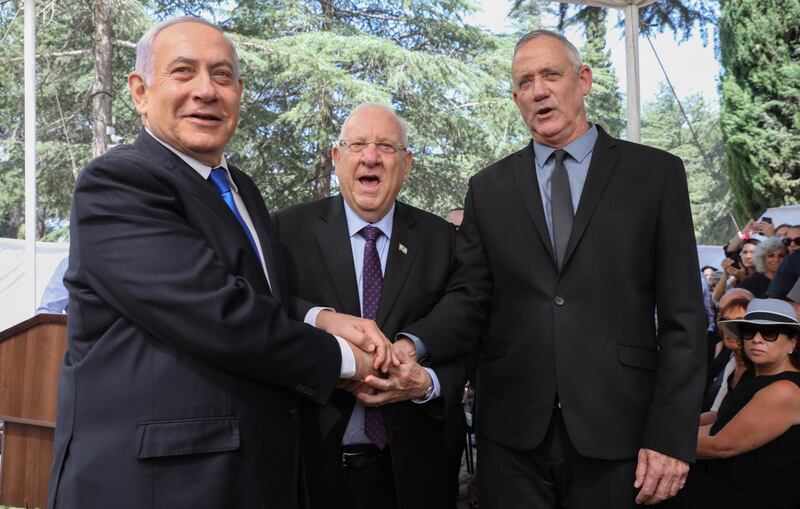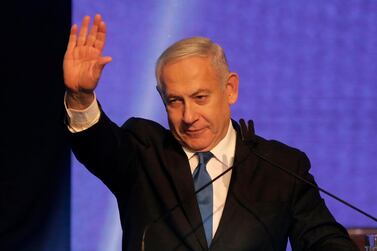Benny Gantz, Israeli Prime Minister Benjamin Netanyahu's main opponent in the country's general election, said on Thursday that he should be prime minister in any coalition, rejecting the Israeli premier's offer to discuss forming a unity government and saying any bloc would not be led by a leader subject to corruption allegations.
Israel's longest-serving leader continues to battle to save his political career amid a wave of corruption allegations and a stinging failure to secure victory at the polls for the second time this year.
The ex-military chief said his alliance had the most seats and he should lead the next government.
"The public voted clearly in favour of unity," Mr Gantz said.
"Blue and White has at the time I am speaking won 33 seats, while Netanyahu has not obtained a sufficient majority to form a coalition as he hoped."
He went on to say that "we will listen to everyone, but we will not accept mandates imposed on us."
The centrist party's senior leaders rejected joining forces in a governing coalition under the incumbent before Mr Gantz' speech.
"We will not enter a coalition led by Netanyahu," senior Blue and White leader Moshe Yaalon told reporters at an event attended by Mr Gantz.
Mr Netanyahu voiced disappointment at his election challenger's rejection to discuss forming an Israeli unity government but said he remained opened to talks.
"I was surprised and disappointed by the fact that, as of now, Benny Gantz still refuses my call to meet," Mr Netanyahu said on Twitter. "Gantz, my offer that the two of us meet stands. It's what the public expects of us."
The offer of a unity government was a U-turn for the Israeli premier, who had called on the campaign trail for a right-wing coalition he hoped would seal his immunity from prosecution over corruption allegations. He released a video message admitting that such a coalition was no longer possible.
"During the elections, I called for the establishment of a right-wing government," he said in a video message.
"But unfortunately the election results show that this is not possible."
He went on to call on Gantz to form a "broad unity government today".
Mr Gantz briefed the media later in the day, saying that Israelis wanted a unity government now. He repeated his call for a unity government. It remains unclear under what terms that unity government would be formed.
In subsequent comments, at a ceremony - which Mr Gantz also attended - marking the third anniversary of the death of Israeli statesman Shimon Peres, Mr Netanyahu said his offer came with no preconditions. A smiling Mr Netanyahu and Mr Gantz warmly shook hands at the event.
Mr Netanyahu hinted at a possible rotating premiership deal with Mr Gantz, noting that Peres, a left-wing leader, had forged a coalition with conservative Yitzhak Shamir in which they rotated top office between 1984 and 1988.
Mr Netanyahu's comments reflected his heightened political vulnerability after again failing to secure a parliamentary majority, following an inconclusive election in April.
With Israeli media reporting more than 95 percent of votes counted in Tuesday's election, a Likud-led right-wing, religious bloc looked poised to control 55 of parliament's 120 seats, with 56 going to a centre-left alliance.
But Mr Gantz had also previously ruled out forming one with a Netanyahu-led Likud, citing looming corruption charges against the prime minister. Mr Netanyahu denies any wrongdoing.
Israel's newly reunified Arab parties, running together under the Joint List alliance, have also emerged as an important force, with the reported results showing them with 13 seats – the third-largest.
That could allow them to block Mr Netanyahu from continuing on as prime minister if they decided to break with precedent and endorse Mr Gantz.
Israel's Arab parties have traditionally not endorsed anyone for prime minister.
After complete, official results are in, Israeli President Reuven Rivlin will hold consultations with all parties voted into parliament and then choose someone to try to form a government.
It will be the second time he has done so since April.
Mr Netanyahu suffered one of the biggest defeats of his political career after April elections.
His Likud along with its right-wing and religious allies won a majority, but he failed to form a coalition and opted for a second election rather than risk having Mr Rivlin choose someone else to try.






